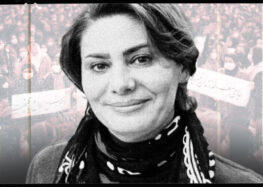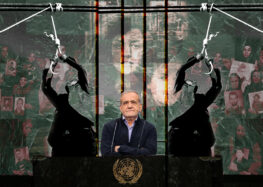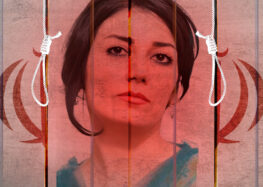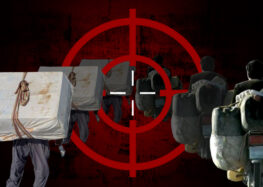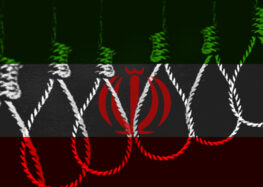At Least 34 Political Prisoners in Iran Denied Access to Medical Care in Recent Weeks
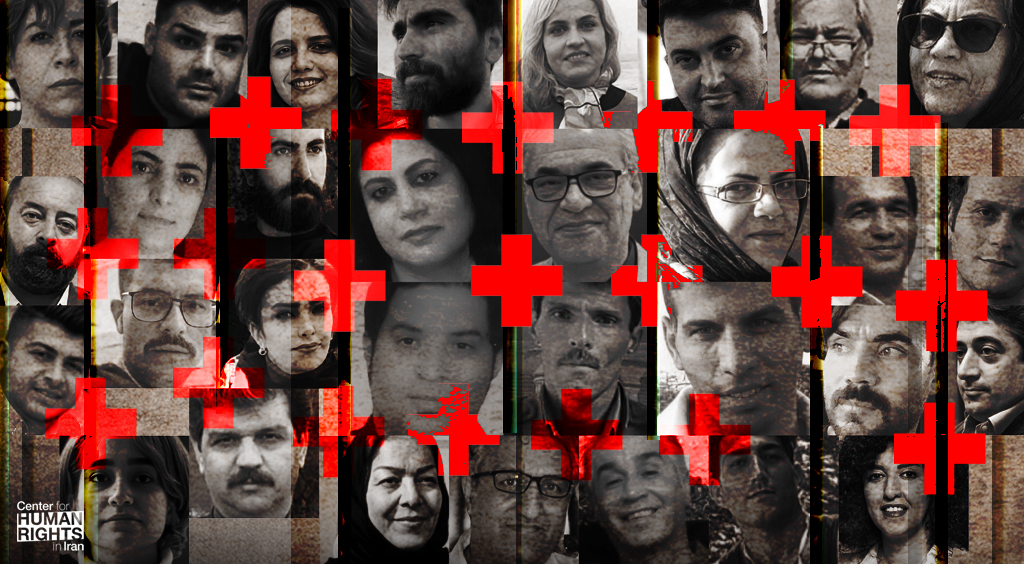 Denial of Critical Care Intensifies as Prisoners Speak Out Against Abuses
Denial of Critical Care Intensifies as Prisoners Speak Out Against Abuses
August 21, 2024 – The deliberate denial of medical care to political prisoners, long a practice in the Islamic Republic of Iran, is increasing as the Iranian authorities intensify their punishment of political opponents. Political prisoners in Iran, who have become vocal critics of Iran’s surging executions and unjust imprisonments, have become particular targets for state abuse.
Between June 1 and August 15, 2024, at least 34 political prisoners in Iran (see list below for their names) were systematically denied access to proper medical services, according to information verified by the Center for Human Rights in Iran (CHRI). This denial included preventing access to prescribed drugs and treatments and rejecting medically required transfers to hospitals for treatment outside the prisons.
“The Iranian authorities’ intentional and systematic denial of medical care to political prisoners is potentially tantamount to murder,” said Hadi Ghaemi, CHRI executive director.
“The immorality and blatant illegality of this denial of care to vulnerable prisoners demands an international outcry,” Ghaemi said. “Without it, the Iranian authorities will quietly continue to try to turn its political prisoners’ prison sentences into death sentences.”
CHRI calls on governments worldwide, the UN, international human rights organizations and medical associations to demand that the Iranian authorities immediately provide full and proper care to all ailing prisoners, including treatment at centers outside of prison whenever necessary.
Key Findings
- Judicial authorities and Iran’s State Prisons Organization have played a direct role in depriving political prisoners of the right to access treatment, aggravating their illnesses and putting prisoners’ lives at risk.
- Despite being fully aware of prisoners’ illnesses, the Iranian authorities have knowingly deprived political prisoners of needed medicines and/or medical services.
- The families of prisoners have been either kept in the dark regarding the deteriorating health of the political prisoners, or denied meaningful cooperation from the authorities after being informed.
- None of the relevant authorities in Iran have been held accountable for deliberately depriving the prisoners of access to medical services. No independent oversight body inside the country, or any governmental organization, has documented the health conditions inside Iran’s prisons.
- Based on documented evidence and patterns, the Islamic Republic’s systematic deprivation of the right to treatment is politically motivated; these restrictions are part of a concerted state campaign of repression and intimidation against peaceful activists and political opponents.
Human rights organizations and the UN have expressed grave concerns over Iran’s denial of medical care to prisoners, which violates the UN’s Standard Minimum Rules for the Treatment of Prisoners and has led to the deaths of political and non-political detainees and prisoners in Iran. The World Medical Association notes that the denial of medical services to prisoners amounts to torture.
Iran’s own State Prison Organization Regulations forbid the denial of medical care, stating that “Examination, and when necessary, treatment of sick convicts is the responsibility of the prison or training facility,” and requires the “constant monitoring of prisoners for any illness” and the participation of the prisoner’s family in the treatment process.
According to Article 502 of Iran’s Criminal Procedure Code, if the prisoner’s condition necessitates it, the judicial authorities must order the transfer of the prisoner to a suitable medical facility outside the prison for treatment, and a prisoner’s sentence can be suspended if incarceration will make their illness worse. Article 29 of the Iranian Constitution declares medical care and treatment to be “universal rights.”
All of these requirements are systematically and routinely ignored by the Iranian authorities, especially when it comes to political prisoners.
Prisoners Suffer Denial of Treatment, Access to Specialists and Medicines
The following are details of the condition of nine political prisoners based on information gathered exclusively by CHRI:
Afshin Beymani, 50, Qezal Hesar Prison in Karaj, suffering from heart disease
Initially sentenced to death on political charges, Beimani has been serving a life sentence behind bars since 2000.
He was arrested at the age of 26, when his daughter was nine months old and his son was three years old. They were arrested along with Beimani and his wife and held in Evin Prison’s Ward 209, under the control of the Ministry of Intelligence, for a month.
He was accused of trying to help his brother, a member of the banned Mojahedin Khalgh Organization, escape Iran. During a chase, the brother was shot dead; Afshin was wounded by three bullets and arrested.
Beimani has been suffering from coronary artery disease since 2017. In July 2001, he underwent cardiac angioplasty at Amirabad Hospital in Tehran. Since then, he was hospitalized several times due to acute heart problems and ultimately underwent open heart surgery.
On July 18, 2024, Beimani lost consciousness due to a drop in blood pressure. He fell to the ground and fractured his skull when his head hit a wall.
During examination, the prison doctor warned that Beimani may suffer a stroke at any time due to blood clots and recommended that he be taken to a hospital to undergo angiography.
But Beimani has refused to go to the hospital chosen by Qezel Hesar Prison authorities and is demanding to be granted medical furlough in order to receive treatment under the supervision of his own specialist doctor.
A person close to the Beimani’s family told CHRI: “His family used to come from the south of the country to visit him several times a year. Because of financial problems, his wife and children moved to his father’s house in Isfahan as they could no longer afford rent. Relatives have gone to the prosecutor’s office several times to request his release on furlough but were told that the Ministry of Intelligence is against it.
The well-informed source added: “His heart problems were caused by being behind bars for 24 years…and torture during interrogation. Of course, the prison food is also unsuitable and inmates do not get sufficient fresh air.”
The person close to the Beimani family said, “Afshin’s daughter and mother were questioned by authorities several times between 2018 and 2019, his daughter’s bank account was seized, and she was threatened with expulsion from university. The authorities also threatened his mother.”
Samaneh Norouz-Moradi, 37, Evin Prison in Tehran, suffering from multiple ailments
Norouz-Mordi, who holds a master’s degree in theater directing, is suffering from breast cancer and lupus. She has not received any treatment or hospitalization for months.
She was arrested on April 24, 2023, by agents of the Islamic Revolutionary Guard Corps (IRGC) Intelligence Organization.
Multiple physicians, including specialists in gynecology, cardiology, pulmonology, dermatology, kidney and urinary tract diseases, neurology, and nutrition have confirmed her poor health.
A rheumatologist stated that Norouz-Moradi “is unfit to resume incarceration due to the aggravation of diseases under stress.”
Norouz-Moradi was put on trial in Branch 28 of the Islamic Revolutionary Court in Tehran, presided by Judge Mohammad Reza Amouzad, on charges of “membership in anti-state groups with the intention of disrupting national security,” “assembly and collusion against national security” and “propaganda against the state” and sentenced to 13 years and nine months in prison. On appeal, her sentence was confirmed to 11 years behind bars.
According to an informed source: “Norouz-Moradi was suffering from various diseases before she went to prison. For this reason, the Medical Examiner ruled she was unfit for imprisonment and suspended her sentence. However, she was rearrested and since no one in her family follows up on her case, and there is not much reporting about her, she has not been sent out of prison for treatment.”
Marzieh Farsi, 55, Evin Prison in Tehran, suffers from cancer
Farsi, a mother of two, was sentenced to 15 years in prison by Branch 26 of Iran’s Islamic Revolutionary Court in Tehran for “treason through supporting the Mojahedin Khalgh Organization.”
Farsi, along with Forough Taghipour, was arrested on August 21, 2023, and held in Evin Prison’s Ward 209 before being transferred to Evin’s Women’s Ward.
She was diagnosed with cancer before her arrest. After treatment, she required special medical care, which is not provided in prison.
Despite the opinion of a specialist physician that she cannot endure prison, the prosecutor has opposed her release.
Afif Naimi, 63, Central Prison in Karaj, suffering from heart disease
Naimi, a follower of the banned and persecuted Baha’i faith, was arrested on April 29, 2023, by agents of the Ministry of Intelligence.
The Appeals Court confirmed his sentence of seven years of imprisonment, a five-billion toman fine (approximately $86,300 USD), a ban on leaving the country, exile from Alborz province, and a two-year ban on social and educational activities.
Naimi, who is suffering from a serious heart disease, had a coronary attack in prison on May 10, 2023. During his previous 10-year imprisonment, he was sent to hospitals outside prison several times due to heart problems.
Naimi struggles to carry out personal routines in prison. The Medical Examiner and specialists have confirmed that he is unable to withstand imprisonment, yet he remains behind bars without access to proper medical care.
He has lost consciousness many times in prison and has been returned to his cell without receiving treatment.
Jaber Sakhravi, 40, Sheiban Prison in Ahvaz, suffering from M.S.
Sakhravi has been in prison since April 2014 without being granted any furlough, despite suffering from multiple sclerosis (M.S.).
Sakhravi was sentenced to 12 years and five months in prison on the charge of being a member of the al-Nidal Movement, an Arab nationalist group, which he has denied. He has one year left of his sentence.
He was taken to a hospital on July 4, 2024, with symptoms of stroke, but was returned to prison a week later without completing the treatment process recommended by the attending physician. This was his second stroke in prison in six years.
“Since Jaber came back from the hospital, they haven’t given him any treatment,” said an informed source. “They only gave him the medicines that he brought from the hospital. He hasn’t been visited by a doctor since coming back from the hospital. Jaber’s physical condition has gotten worse,” said the source.
“At the request of the Attorney General, his family posted a bond of 1.5 billion tomans ($25,860 USD) three years ago to gain his release and start treatment, but the authorities haven’t allowed his release,” the source added. “The right side of his body, from his eye to his jaw and right hand and leg, have become disabled.”
When Sakhravi does not receive his medications, he suffers seizures.
“When Jaber suffered strokes in prison, we would take him to the bathroom and massage and move his arms and legs. Because of these strokes, his right leg shortened by a few millimeters, so his cellmates made him a wooden heel to put in his slippers so that he could keep his balance walking.”
The source, who is close to Sakhravi, said: “Jaber is very sick. Something needs to be done by the authorities, but neither the prison officials nor the office of the Attorney General have responded to the numerous requests from the family.”
Anvar Chaleshi, 50, Central Prison in Orumiyeh, suffering from colon cancer
Chaleshi was transferred to a hospital from the Central Prison in Orumiyeh, northwest Iran, to receive treatment for his worsening colon cancer in late April 2024. However, he was chained to a bed and did not receive treatment due to his inability to pay for medical care, and the refusal by the IRGC intelligence officials to grant his request for medical furlough.
The 50-year-old from Orumiyeh was arrested by IRGC intelligence agents on December 2, 2020, and transferred to the al-Mahdi barracks.
In September 2021, the Islamic Revolutionary Court sentenced him to seven years in prison on the charge of “membership in anti-state groups.”
Despite the confirmation of Chaleshi’s cancer by the Medical Examiner, the IRGC has opposed granting him furlough for medical treatment.
Vesam Mazraeh, 32, Sheiban Prison in Ahvaz, suffering from cancer
The authorities in Sheiban Prison in Ahvaz are preventing medication purchased by Mazraeh’s family from reaching this prisoner, who is suffering from cancer. Meanwhile, the prison pharmacy does not have the drugs he requires.
Mazraeh urgently needs treatment by a specialist doctor outside prison.
He has served three years of a 15-year prison sentence for “rebellion.”
Abdolamir Zargani, 28, Sheiban Prison in Ahvaz, suffering from cataracts
Zargani’s advanced cataracts have severely weakened his vision. He requires immediate treatment by a specialist to prevent further deterioration of his health and loss of vision.
Born in Ahvaz, Zargani was arrested by Ministry of Intelligence agents for his online posts and sentenced to two years behind bars on charges of “propaganda against the state” and “publishing falsehoods.”
Hamzeh Savari, 37, Qezel Hesar Prison in Karaj, suffering from M.S.
Savari is serving the 19th year of a life sentence. Despite poor physical health, he has been deprived of proper medical treatment and hospitalization.
On September 11, 2007, two of his brothers, Mohammad Ali and Jafar, were executed on the charge of “waging war,” based on confessions extracted under torture. Hamzeh also lost his mother while in prison, but he was not granted leave to attend her funeral.
Savari was diagnosed with Baker’s cyst about five years ago. Since then, due to the lack of proper treatment, the cyst has grown and affected leg tendons, such that he walks with great difficulty. The prosecutor has opposed his transfer to a medical facility outside prison.
Savari has also been suffering from varicocele for the last eleven years. Nine years ago, he was sent to a medical center for surgery. However, the disease recurred three years ago, but his repeated requests for proper medical care have been rejected. His varicocele has caused an inability to properly excrete urine, and according to the doctor, damage to his kidneys.
Savari was arrested by security agents on September 2, 2005, when he was 19 years old. He was sentenced to death by the Islamic Revolutionary Court in Ahvaz for the charges of “corruption on earth,” “waging war” and “acting against national security.” His sentence was later reduced to life imprisonment.
Growing Numbers of Political Prisoners Denied Care in Prisons Across Iran
The following 34 political prisoners have been confirmed by CHRI to have been denied medical care just during the June 1, 2024 – August 15, 2024, period:
- Reza Shahabi (Evin Prison, Tehran)
- Sajjad Imannejad (Evin Prison, Tehran)
- Gholamreza Aghdasi (Evin Prison, Tehran)
- Jamal Ameli (Evin Prison, Tehran)
- Azar Korvandi Mousazadeh (Evin Prison, Tehran)
- Samaneh Norouz-Moradi (Evin Prison, Tehran)
- Marzieh Farsi (Evin Prison, Tehran)
- Hossein Koushkinejad (Evin Prison, Tehran)
- Mohammad Rezvani Kashani (Evin Prison, Tehran)
- Taher Naghavi (Evin Prison, Tehran)
- Houra Nikbakht (Evin Prison, Tehran)
- Sarvenaz Ahmadi (Evin Prison, Tehran)
- Hassan Saeidi (Evin Prison, Tehran)
- Afshin Beymani (Qezel Hesar Prison, Karaj)
- Reza Salmanzadeh (Qezel Hesar Prison, Karaj)
- Nejat Anvar Hamidi (Qezel Hesar Prison, Karaj)
- Meysam Dehbanzadeh (Qezel Hesar Prison, Karaj)
- Hamzeh Savari (Qezel Hesar Prison, Karaj)
- Rouhollah Kavousi (Sheiban Prison, Ahvaz)
- Vasam Mazraeh (Sheiban Prison, Ahvaz)
- Alireza Mardasi (Sheiban Prison, Ahvaz)
- Jaber Sakhravi (Sheiban Prison, Ahvaz)
- Abdolamir Zargani (Sheiban Prison, Ahvaz)
- Karim Esmailzadeh (Central Prison, Tabriz)
- Morteza Parvin (Central Prison, Tabriz)
- Anvar Chaleshi (Central Prison, Orumiyeh)
- Mohammad Davari (Adelabad Prison, Shiraz)
- Maryam Jalal Hosseini (Kachuei Prison, Karaj)
- Afif Naimi (Central Prison, Karaj)
- Zeinab Jalalian (Central Prison, Yazd)
- Sara Jahani (Laka Prison, Rasht)
- Narges Mohammadi (Evin Prison, Tehran)
- Saman Yasin (Qezel Hesar Prison, Karaj)
- Rezvaneh Ahmadkhan-Beigi (Evin Prison, Tehran)
“Iran’s State Prisons Organization and its judiciary chief are responsible for the lives and safety of all prisoners,” Ghaemi said. “The international community should hold them accountable for their deliberate and life-threatening denial of medical care.”
This report was made possible from donations by readers like you. Help us continue our mission by making a tax-deductible donation.


